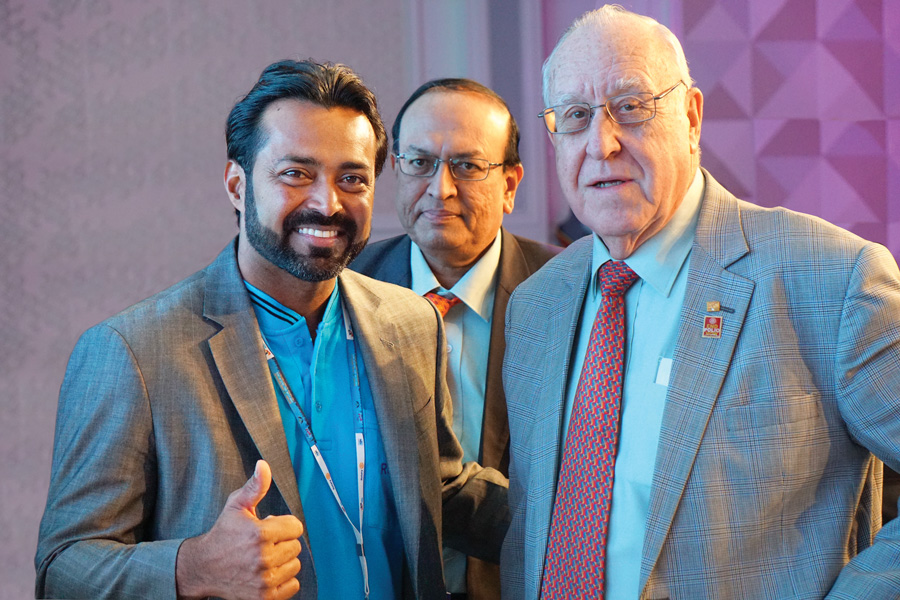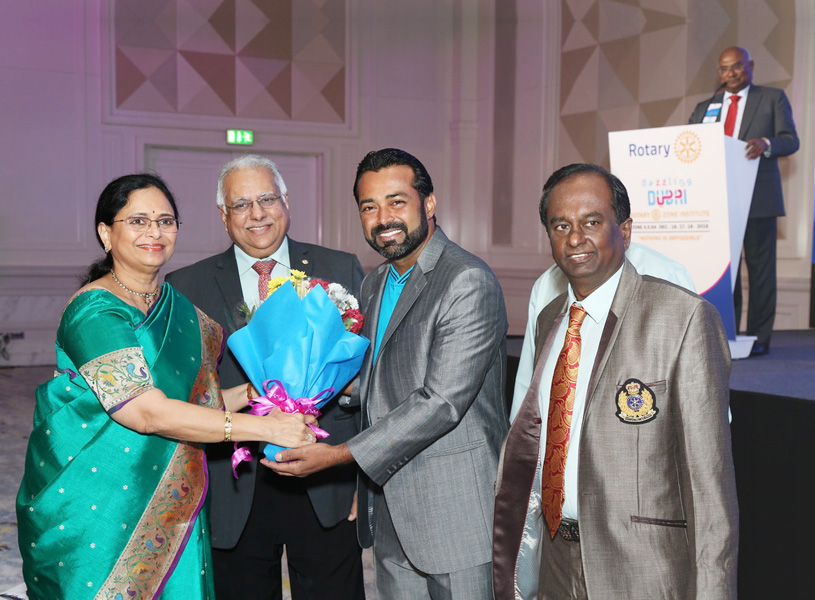All about Partnerships The mantra for success in partnerships is to choose partners who cover your weaknesses, says Leander Paes, the king of doubles in tennis.

RI President John Germ.
If any lessons are to be learnt on how to keep an audience spellbound, tennis star Leander Paes had them all, as he captivated the imagination of the packed hall at the Dazzling Dubai Zone Institute in December.
The theme of his address, not surprisingly, was Partnerships are important, and speaking straight from the heart, Paes went on to unravel for the participants his magic journey in the world of tennis from an early age.
Right from the moment he dramatically took off his jacket to reveal the Rotary tee-shirt he was wearing inside, Paes became the darling of the audience. His address, which did not adhere to the time frame, but had nobody complaining, was filled with an expression of love and admiration for his parents, the way they shaped his life and values, an account of his tenacity and courage and how a little butterfly that sat on his raquet at the 1996 Olympics, helped him win the medal that he had coveted all his life.
My mother captained India in basketball, she was all of 5 ft and nothing! She had tremendous speed and thanks to her genes, I was born an athlete.
“As a little boy I had a dream to emulate my parents. My mother captained India in basketball, she was all of 5 ft and nothing! She had tremendous speed and thanks to her genes, I was born an athlete.” His father’s dream was to get a medal in hockey at the Munich Olympics in 1972. “The Games in Munich were shut down for two days as Palestinian terrorists held Israeli athletes hostage; the athletes were not allowed to go outside, nobody was allowed to come inside, no TV crews, no newspapers were allowed. The army took control of the village. I don’t know what my parents were thinking, but I was born nine months later! So I can say I am an Olymics kid!”
When he was a kid his father gave him Rs 100 everyday to spend on video games. “I thought he was the best dad ever. But I didn’t realise the method in my father’s madness was to actually develop athletic skills in me; eye and hand and eye and feet coordination necessary to become an athlete.”
Paes told the mesmerised audience how as a kid he would polish his father’s Olympics medal with Brasso “and as I made it shine, I wanted one of my own.” With the speed inherited from his mother, he started playing football and was selected for the Barcelona team. As an 11-year-old he went to Spain, visited the academy, and his dream was to become a great football star but for that he would have to give up his home, his country, his passport and play for Spain.

“That was the first lesson I learnt about professionalism… that it doesn’t matter where you live, who you partner with, but what matters is you surround yourself with the right people, have a dream and choose the right professionals to achieve that dream. Who you partner with makes you what you are. You have to be a student of life, learn from your peers, your coaches… only then can you achieve excellence.”
And excellence he did achieve as can be seen from a recent certificate that 14-time Grand Slam winner Rafael Nadal gave him: “Leander is one of the biggest stars in doubles and one of the best players in the history of tennis.”
When he gave up football, he told his father, from the top of his head, that he’d like to play tennis. “I told him find me the best tennis academy and I’ll tell you in a year if I want to continue with tennis.” Paes enrolled with the Britannia Amritraj Tennis Academy in Madras in 1985, and the academy played a key role in his early development. “I was the youngest of eight kids at the specialised academy; we woke up at 4.30 am, had to be on the court at 5 am, and for every minute we were late, we had to run 60 laps on the tennis court.” Discipline was the key: from 5 to 8 am they practised tennis. After school, they were back to the court at 4 pm, and till 7.30 pm “we played matches, simulated what we would play at the US or Australian Open, Wimbledon etc.” Homework, dinner and then time to write long letters “where I told my parents and sisters how much I missed them, particularly when I had fever. As a 13-year-old, I learned how to manage bank accounts, passports, travel bookings, and travel the whole globe. I remember one line my father wrote in a 101-page letter, and it was all about how tennis was your vehicle to become a man. That line said: ‘Use this vehicle to move the world’.”
I am a big believer in karma, and a practising Buddhist and I believe that partnerships are not just between human beings.
Next Paes took the audience on a fascinating flashback in time… to that magic day in the 1996 Atlanta Olympics, where he played Andre Agassi, “one of my dearest friends and one of the greatest human beings ever”. When he was 18 and won the Juniors title in US open, and got scholarships to 10 colleges, including those at UCLA, Harvard, Stanford, Barcelona, “he told me that to be a real professional athlete you have to move to the US and live here.”
Taking his advice, Paes moved to the Harry Hopman Tennis Academy in Florida and trained there for four years. “I am very grateful to America and American tennis for the opportunities they gave me to hone my skills.”
He played his first Olympics game in 1992 in Barcelona but in 1996 at Atlanta, “it was time to get the medal I had always coveted”. Paes then went on to relate a gripping acccount of how in the very first set, he devised a strategy to unsettle Agassi, who was “taller, bigger, stronger and with better tennis techniques than I had. I felt I had to play him using my heart, my physical acumen, my mental toughness and intelligence. I started playing drop shots and lobbies… front and back, when I moved him, I felt I made him uncomfortable and played the match on my terms.”
Using all these strategies, in the Atlanta semi-finals, “in the first set, I had him in all sorts of trouble; it was 5–6 in the first set and at 15–40 I found myself at two set points, and half an hour away from getting my dream medal.”
But the brilliance of Agassi was that he exploited Paes’ weakness, which was backhand. Suddenly Paes found himself getting a backhand shot from Agassi, “as hard as he could hit it, at my right jaw, the toughest shot for a right-hander to handle.”
His wrist was in a weak position; “the racquet hit my face, the ball hit the racquet, the racquet fell on the ground and snapped a tendon between my wrist and elbow. I was in excruciating pain.” His American trainer said he had to end the game; “step down, you are going to hurt your career if you continue. But I said strap me up and let me back on that court. I’ve lived for this moment, this moment is more important than me, it will prove that we Indians can be world beaters. That as a young boy from Calcutta I can be the best I can on the global stage.”
Even though he continued the game in excruciating pain, he lost the set and the match. Paes explained that this was the first Olympics where a match had to be played for the bronze medal. In the previous Olympics, both the semi finalists would get a bronze.
Andre Agassi, one of my dearest friends, told me that to be a real professional athlete you have to move to the US and live here.
He was rushed to a hospital after the match, his hand was in a hard cast; and yet defying all odds, he played the match for the bronze after 48 hours. It was during this match, which he was about to lose, as his hand was in terrible pain, a butterfly sat on his racquet, flew away and then returned.
“I am a big believer in karma, and practising Buddhist and I believe that partnerships are not just between human beings. As I came up to serve a little red, white and blue butterfly sat on my racquet.” He went up to the net to talk to his opponent, who was on the verge of winning, about this butterfly, actually to “distract him”! He managed to do just that; did the first serve, hit a volley, saved a break point, and won that game. “And I went on to win the match!”
Recounting how the Rotary ‘Service above Self’ has defined his life, he said at the age of 9 he had got a cheque for $329 as his first tennis award, “and I wanted to do all kinds of things with that money, like buying an ice cream factory, or a fancy house in Bombay, or at least lots of toys and clothes.” But his dad took him to Mother Teresa, and both of them coaxed him to donate the money for an orphanage. “I started with five children, today I support 10,000 children. My first tennis prize money taught me a lesson. Sometimes by giving back you achieve a lot more.”
As a kid when I polished my father’s Olympics medal with Brasso, and as I made it shine, I wanted one of my own.
As Rotary looks around for good partners to leverage its skills, Indian tennis sensation Leander Paes, who has excelled at winning doubles matches, had some tips to offer. “The first lesson I learnt in my career is that a lot of our skills are god given, and many of them we polish daily.” What was important in a partnership was to understand “ourselves first… and make peace with both our strengths and weaknesses. Once we know our weaknesses, we can choose a partner with strengths to cover our weaknesses. And our strengths will cover their weaknesses.”
A legend for winning doubles matches, which require the perfect understanding and coordination with the partner, Paes said “in my partnerships in tennis, the sum of two individuals is greater than two. And you should look for the same when you choose your partners to do so much of good in the world.”
Pictures by K Vishwanathan

